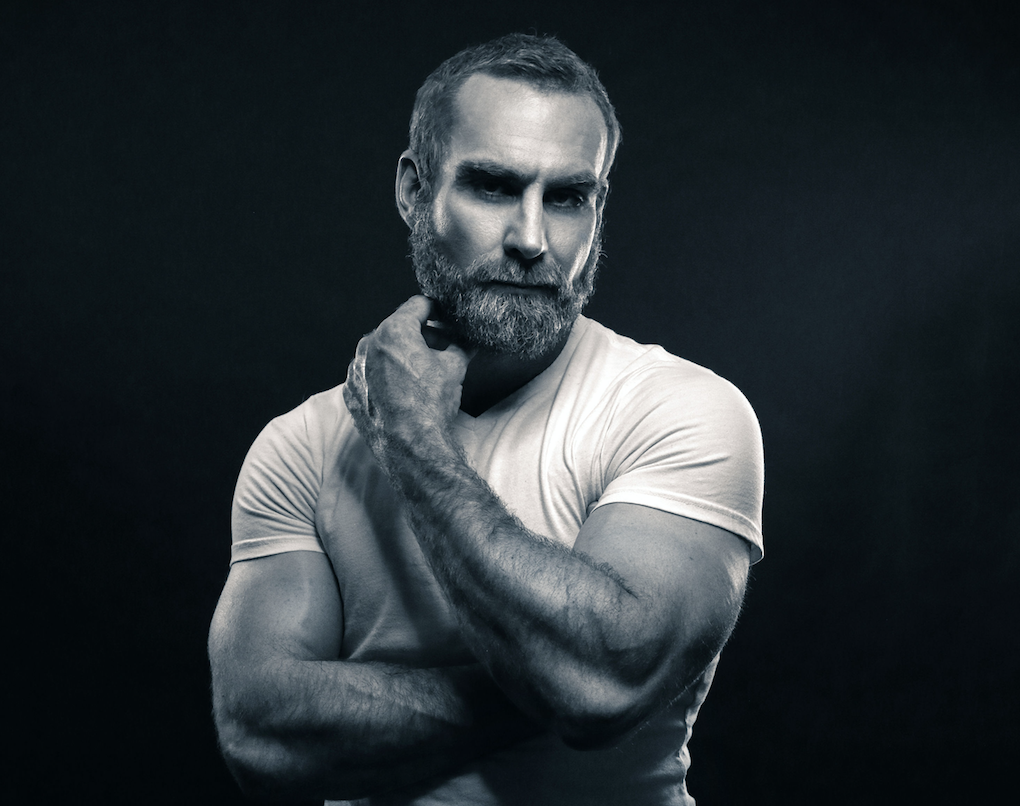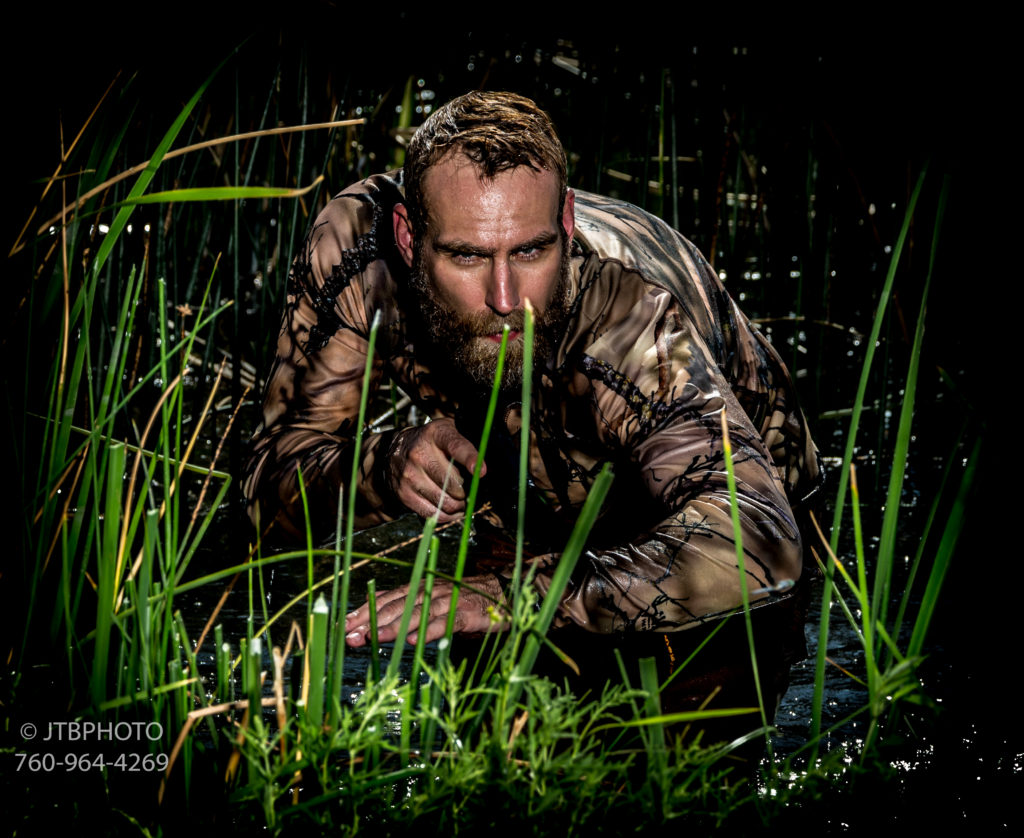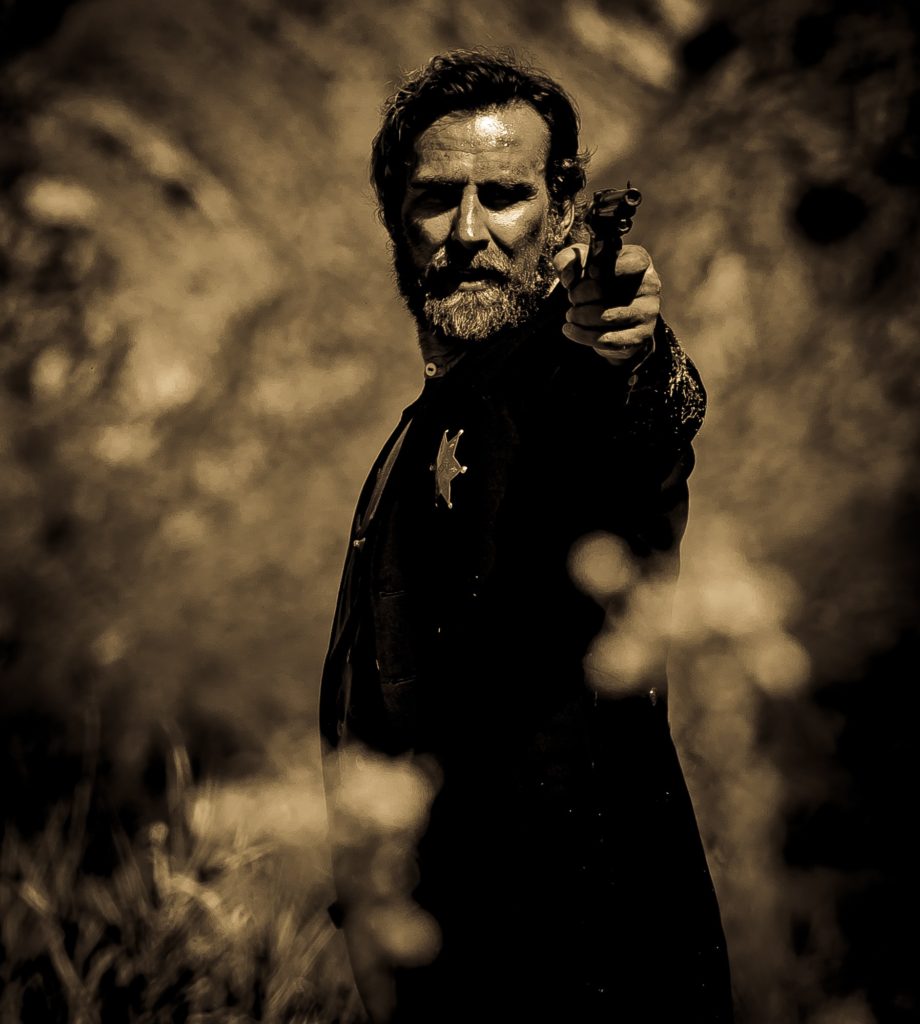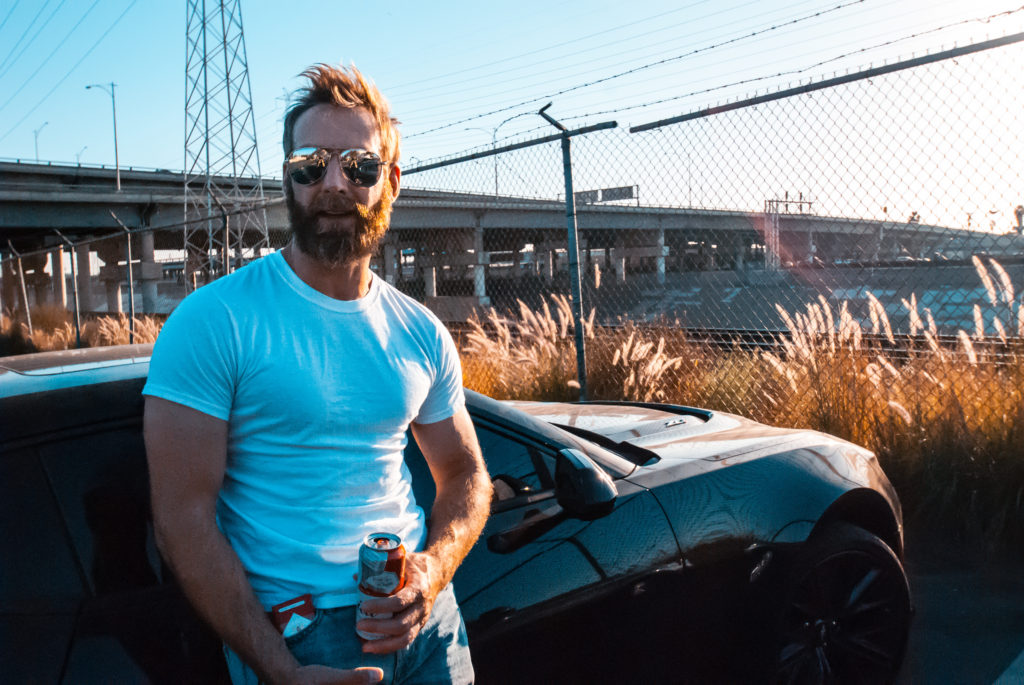
From the SEAL teams to Hollywood: One-on-One with David Meadows
The former Navy SEAL-turned-actor’s life has been anything but typical. Here, he talks about what inspires him to lead an extraordinary life, where he finds daily inspiration, and what you can do to create the life you’ve always wanted.
INTERVIEW BY MATT TUTHILL
Robert Irvine Magazine: What made you want to join the military?
DM: I went in straight out of high school. Originally, I wanted to be an architect, then changed my mind about that. I decided instead I wanted to go to medical school, which my parents were pushing me to do. But by the time I got to the end of high school, I just knew I hated school, specifically things I didn’t want to study in any way. So I said why do I want to pound my head on this?
I’m all or nothing. If I have a topic I’m interested in, I’m ravenous and will go non-stop, and if I’m not, it’s pulling teeth. So I knew I wasn’t feeling eight years of school. I wanted to get out there in the world and start doing stuff.
Then on Discovery Channel, I saw a documentary about the history of the SEAL teams. I said that’s what I want. I’m gonna make that happen. So I started training and researching. Everyone said, “Yeah, everyone tries, but no one makes it in, so don’t even try.” I said “somebody does, and that’s gonna be me.”
I found a mentor, Frank Hoagland, retired out of Seal Team Six and took me under his wing and tutored me on everything I would need to know. I joined the Navy at 18, went into BUD/s [Basic Underwater Demolition/SEAL School] and failed a test so I was out. Then I was stationed in Greece for 18 months, went to BUD/s again, made it through the first two phases, suffered in a diving injury, and got rolled back. But I made it through and graduated: Class 245.
By that time, the war was hot and heavy. The teams were getting in more combat altercations in a month in a half of a deployment than SEALs before them had done in an entire career. On last deployment, which was 100 days, I was in 56 live combat missions with gunfights.
RI: You were taken in by a documentary. What drew the other guys to that kind of life?
DM: I think it’s a whole hell of a lot of ego about being the complete alpha guy with a lot of stuff to prove. It’s because anyone who is drawn to that kind of life, they have many qualities in common. They are adaptive, flexible, multi-talented, seeking self-development and challenge. All the SEALs I knew, that was one part of their lives; when they leave they go on to become entrepreneurs. They don’t become docile. They demand a lot out of themselves.
I took a screenwriter friend of mine to meet the teams and she couldn’t get over how smart, quick they all were. She thought they would all be Neanderthals. If I were to write a book, it would be about the multi-faceted talents. Astronauts, doctors, actors, come out of the teams.
Taylor Canfield, an old teammate of mine, drives NASCAR now. Another buddy does test driving for Aston Martin. Stunt parachuting… these are the kinds of things guys go and do afterward.
Anyone who sought being in the teams, they never wanted a normal life. I wanted my life to be something you would write books about. I wanted to experience all of life. I never felt the draw of a safe or normal life. I never wanted a 9-5 job or to just get married and have kids… I want a family but I don’t want the safe rendition of it. I want a wife who is a complete badass partner in crime and we’ll adventure around the world together. The kids will see Europe and do rock climbing, and shoot guns, and learn multiple languages, and take theater classes, and be well-rounded adaptive human beings.
RI: Acting wasn’t your first gig when you left the teams.
DM: No. I worked for a Fortune 500 defense contractor. I hated it. I was an expert in all the technology that the company sold but didn’t understand. I basically helped sales reps. They sold night vision and radio systems and other tactical gear. I’d come in to help close the deal when that was needed. The sales rep would try to sell it but they couldn’t explain it fully, so they had an advisor like me.
But it sucked. It was working in corporate America. It was everything I didn’t want. It was a bunch of people with big egos, small-mindedness, massive insecurities, trying to act like that just because they made a lot of money that that made them relevant. They were insecure and scared, with the mindset that having money made you a good person. Money to me… I’ve always made money and found it easy to do so. Because I never focused on making money. It was a byproduct.
That’s when I felt my call to acting. I had this epiphany that I wanted to do it with the same tenacity and dedication that I pursued the SEAL teams with. I want to be classically trained in Shakespeare. I didn’t want to be a fraud or just make it because I had a certain look. I wanted people to say, “Oh, he’s really good.”
RI: And since that epiphany, you’ve been in movies like Captain Phillips, and shows like House of Cards, Turn, Bansheee…
DM: And the more and more I do it, the more I fall in love with it. I’ve been very fortunate it in my career. I was never an extra. Even when I was Guard Number 1, I had lines. I was never just in the background. And I love it even more now that I’m learning the production side of the game—writing, developing, producing.
RI: And what are you working on right now?
DM: A drama-thrilled called Badlander that takes place in a small dessert town. I’m leading that for Lionsgate. Then there’s a horror film in a Rob Zombie-esque style development, called Love.
Angel was a short film I made with my producing partner; we have a 17-minute version that was well-received and they’re working on a feature-length film.
RI: What were the movies you loved as a kid? Or the ones that made you want to pursue this?
DB: I loved anything that touched me, made me think. One of my favorite movies of all time is Terminator 2. It was an action movie with so much heart, soul, and message to it.
Somehow through the interaction with the terminator, mom, and child, they tell this apocalyptic cautionary tale, but they talk about this very human thing and very human message. “I look forward to the first time with a sense of hope, that if a machine, a terminator, can learn the value of human life, then maybe we can too.”
That was the point of the whole movie and it was beautiful. It’s a legacy classic like Jaws.
I think we’re in the golden age of TV. There are more risky, character-driven stories being created now than ever before in history. A lot of that is because of the number of outlets. Cable, streaming, networks, etc.
There are more pathways to so many unique visions. And because there is so much content, your shit has to be good. It has to be tight because people have options. They’re not just gonna watch it just because it’s on. Back in the day, some of the shows that became incredibly popular wouldn’t even survive now.
I gravitate towards shows that are intelligently done, character driven projects that make me think and challenge ideas. Penny Dreadful was such a unique spin on that genre. I love Black Mirror, True Blood, especially the first four seasons. I really love Mercy Street and Banshee, and not just because I was on both of those. Banshee had some of the best hand-to-hand combat scenes in TV history.
RI: So many people write in to say they’re stuck. You’re someone who not only doesn’t have that problem, you’ve achieved at an extremely high level. If someone comes to you and says they’re stuck, what advice do you have?
DM: The very first step is you’ve got to be honest and say, “I’m not happy.” The second thing: understand that if you’re not happy, then most of the time the reason people are not happy is because they’re not being honest about what makes them happy. They’re living their life for someone else and looking for external points of guidance. It’s a psychological phenomenon knowns as the mass effect—a social construct that has made us enamored of looking externally for how we should behave.
“Someone tell me what I should want. Someone tell me what to do, if I’m right or wrong.” And they don’t listen to the one voice that really matters: their own. That’s why everyone is so depressed. They look externally, they look on social media, they’re looking to a standard that is not their own. It should all be from you. I shouldn’t look to my friends. I should choose my friends based on what I want to do with my life.
I always had an innate sense of this, but at times second-guessed it and went the other way. I often marched to the beat of my own drum, but made choices based on what other people told me would be better. I was told not to torment myself trying to be in the SEALs. If I would have listened to those people and let them steer me away from what I had in my heart, I wouldn’t have been have the man I am today.
I’ve been miserable, and f*$%ed up, but I’ve been brave enough to admit it. The more you f*$% up and you’re honest and admit it and grow from it, then you’re going to be much better off. F*$%ing up is a part of learning and growing. That’s how we learn and grow.
So often, people look at things the opposite way. They think, unfortunately, that saying something like, “I was wrong. I made a mistake,” is a bad thing. It’s not! It’s the base of something great because you’re admitting that you did it. Not, “somebody else screwed me over” I did it. Now I’m going to fix it. It takes you out of the victim mentality, that nonsense of, “Oh they did it! Woe is me!”
Own your choices and now you can do something about it. Anybody can do that! It is not about talent, genetics. It is a conscious choice. It doesn’t matter how many mistakes I have made in my lifetime. What matters is I take ownership of them and by owning them, I empower myself.
By looking towards others, you are literally giving your power away. So the way I see it, there are three keys to being happy:
1) Accept that you are not happy.
2) Accept that it’s your fault.
3) Accept that you have the power to change it.
If you accept those three things, your life will be on the track you want it to be.
RI: How can the average person get to the point where rejection doesn’t bother them? You chose to join an elite fighting group and it didn’t work out and everyone told you to stop trying. Eventually you make it. Then in civilian life, you choose to act, and 90 percent of that career is rejection that you have no control over. No matter where your career goes, there will always be moments where you’re not tall enough, not this, not that… and you don’t get jobs for that reason.
DM: That came from my mother. My mom is the strongest woman I have ever known. Everyone says that about their mom and they should. But she raised me as a single mom. My dad died when I was about two years old. They were divorced when I was six months. My grandparents stepped into help, but my mother raised me alone, until I was 13. She got her bachelor’s degree and her master’s. We grew up poor as f*$% in West Virginia. We couldn’t afford milk! Nothing! No money whatsoever.
My mom, no matter how bad life sucked and things hurt and no matter how bad life f*$%ed us, she never made an excuse. She’d say, yeah, that’s how it is. She understood, you’re never going to be trouble-free and smooth sailing. There will always be pain, heartache, issues… The key to being happy is accepting that. She understood life is not about not having problems, it’s about how you respond to them. What you can control is how you respond to those problems.
I would highly recommend the book, The Subtle Art of Not Giving a Fuck. It can teach you a lot. People think they’re unhappy because their marriage is falling apart. They’re really upset by a choice they made, which means you can fix it. You’re never going to be in a relationship that doesn’t have problems. There will always be challenges and problems. But if it’s someone you want to be with, then those troubles are worth it. When things fall apart, they’ve decided those troubles aren’t worth it. The key to happiness is being in love with the problem, not the solution.
When I get this much money, when I win this award, when I get a great girlfriend… no. None of those markers work. You have to create your own.
None of these things aren’t easy. They’re hard. But anyone can do them.
Follow David Meadows on INSTAGRAM and learn more at DavidBMeadows.com




